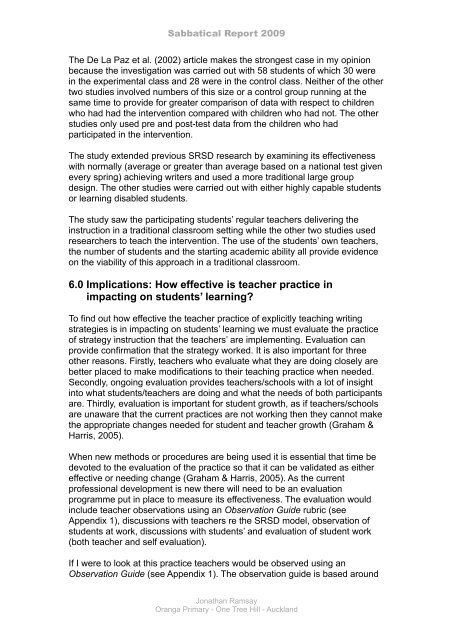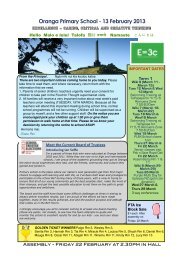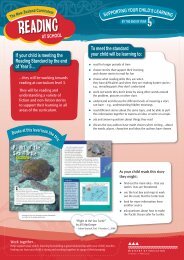Sabbatical Report - Oranga School Website
Sabbatical Report - Oranga School Website
Sabbatical Report - Oranga School Website
You also want an ePaper? Increase the reach of your titles
YUMPU automatically turns print PDFs into web optimized ePapers that Google loves.
<strong>Sabbatical</strong> <strong>Report</strong> 2009<br />
The De La Paz et al. (2002) article makes the strongest case in my opinion<br />
because the investigation was carried out with 58 students of which 30 were<br />
in the experimental class and 28 were in the control class. Neither of the other<br />
two studies involved numbers of this size or a control group running at the<br />
same time to provide for greater comparison of data with respect to children<br />
who had had the intervention compared with children who had not. The other<br />
studies only used pre and post-test data from the children who had<br />
participated in the intervention.<br />
The study extended previous SRSD research by examining its effectiveness<br />
with normally (average or greater than average based on a national test given<br />
every spring) achieving writers and used a more traditional large group<br />
design. The other studies were carried out with either highly capable students<br />
or learning disabled students.<br />
The study saw the participating students’ regular teachers delivering the<br />
instruction in a traditional classroom setting while the other two studies used<br />
researchers to teach the intervention. The use of the students’ own teachers,<br />
the number of students and the starting academic ability all provide evidence<br />
on the viability of this approach in a traditional classroom.<br />
6.0 Implications: How effective is teacher practice in<br />
impacting on students’ learning?<br />
To find out how effective the teacher practice of explicitly teaching writing<br />
strategies is in impacting on students’ learning we must evaluate the practice<br />
of strategy instruction that the teachers’ are implementing. Evaluation can<br />
provide confirmation that the strategy worked. It is also important for three<br />
other reasons. Firstly, teachers who evaluate what they are doing closely are<br />
better placed to make modifications to their teaching practice when needed.<br />
Secondly, ongoing evaluation provides teachers/schools with a lot of insight<br />
into what students/teachers are doing and what the needs of both participants<br />
are. Thirdly, evaluation is important for student growth, as if teachers/schools<br />
are unaware that the current practices are not working then they cannot make<br />
the appropriate changes needed for student and teacher growth (Graham &<br />
Harris, 2005).<br />
When new methods or procedures are being used it is essential that time be<br />
devoted to the evaluation of the practice so that it can be validated as either<br />
effective or needing change (Graham & Harris, 2005). As the current<br />
professional development is new there will need to be an evaluation<br />
programme put in place to measure its effectiveness. The evaluation would<br />
include teacher observations using an Observation Guide rubric (see<br />
Appendix 1), discussions with teachers re the SRSD model, observation of<br />
students at work, discussions with students’ and evaluation of student work<br />
(both teacher and self evaluation).<br />
If I were to look at this practice teachers would be observed using an<br />
Observation Guide (see Appendix 1). The observation guide is based around<br />
Jonathan Ramsay<br />
<strong>Oranga</strong> Primary - One Tree Hill - Auckland




